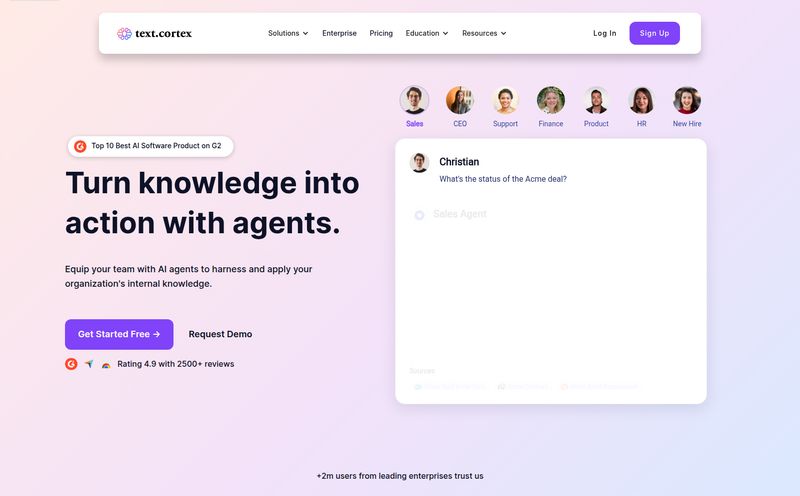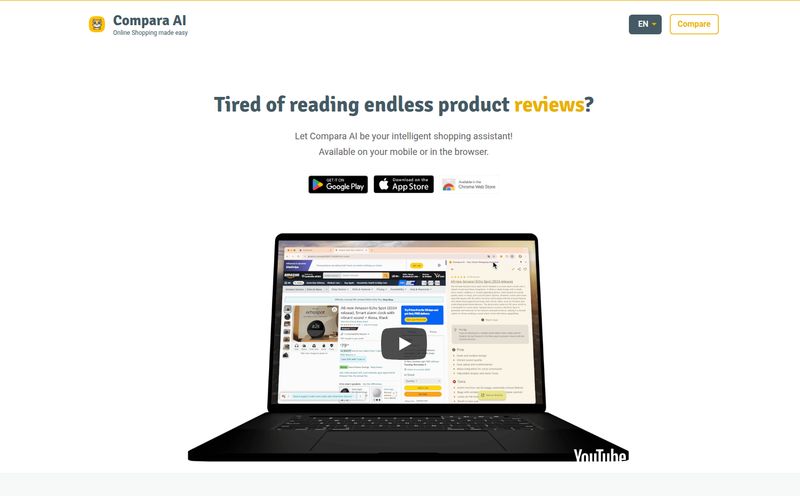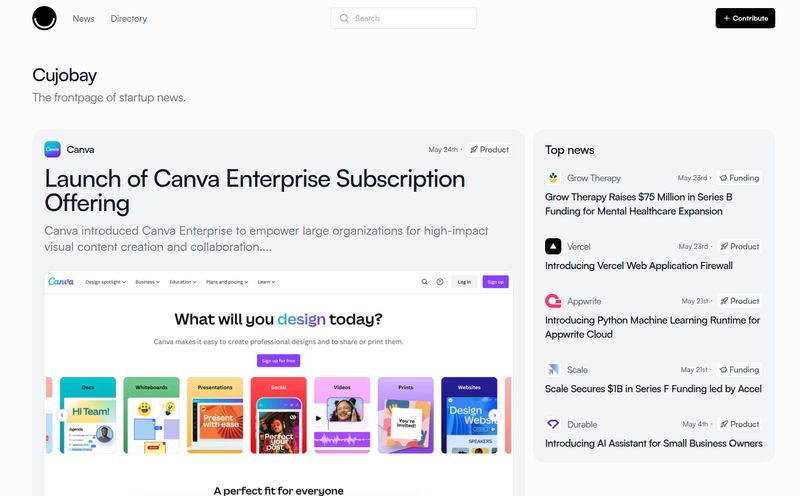We’re all drowning in information. Every day, it feels like we’re trying to drink from a firehose of content, SEO-optimized articles, conflicting reports, and a million open tabs. For years, Google was our trusty ship in this vast ocean, but lately... doesn't it feel like the ship is a bit leaky? Full of ads, sponsored content, and results that feel more engineered than genuinely helpful.
I've been in the SEO and traffic game for years, and I’ve seen the landscape shift dramatically. We're now in the era of AI-powered search, with tools like Perplexity and You.com trying to rethink how we find what we're looking for. It's an exciting, slightly chaotic time. So when a tool called Brain Assistant landed on my radar, my curiosity was definitely piqued. It promises not just better search, but a personalized search experience. A second brain, if you will.
But does it live up to the hype? Or is it just another flash in the AI pan? I decided to take a look under the hood.
So, What Is This Brain Assistant Thing Anyway?
First off, a little branding confusion. The tool is called Brain Assistant, but the logo I've seen floating around says 'Rezolvo AI'. My guess is Rezolvo AI is the parent company or the platform it's built on. It happens. What matters is the tech.
At its core, Brain Assistant isn't trying to be just another search engine. It’s positioning itself as your personal knowledge hub. Think of it less like a public library and more like your own private, hyper-intelligent librarian. Someone who not only knows how to search the entire internet in real-time but also has read and memorized all of your important documents.
It combines live web search with the ability to create a personalized knowledge base from files you upload—PDFs, Word documents, text files, even CSVs. The goal is to give you immediate, accurate answers drawn from both the public web and your private data. A pretty compelling pitch, right?
The Features That Actually Matter
A feature list is just a list until you see how it applies to your actual workflow. Here’s what stood out to me as a professional who deals with a ton of information daily.
Build Your Second Brain, For Real This Time
The concept of a 'second brain' has been a productivity Holy Grail for a while now. We've tried to build them in Notion, Evernote, you name it. Brain Assistant’s approach is what really grabbed me. The ability to upload a folder full of research papers, client briefs in Word docs, or financial data in CSVs and then… just… talk to it? That’s a game-changer.
Imagine you're a market researcher. You can upload dozens of industry reports as PDFs. Instead of CTRL+F-ing your way through each one, you can just ask, "What's the projected CAGR for the European EV market according to the reports from Q4?" and get a synthesized answer. Or if you’re a student, you could upload all your course notes and textbooks and ask, "Summarize the key arguments against Keynesian economics from my uploaded lecture notes." That's powerful stuff.
Searching the Web Without the Fluff
Beyond your own files, it also searches the web in real-time. The promise here is “optimized search results” and summaries. This is a direct shot at the 10 blue links we've grown accustomed to. Instead of getting a list of websites you have to click through, the idea is to get the answer directly. This is fantastic for cutting through the SEO spam and getting straight to the point, whether you're trying to understand a complex topic or find the best price on a new gadget.

Visit Brain Assistant
Finally, a Tool That Speaks My Language (and 94 Others)
I was genuinely impressed to see it supports 95 different languages. As someone who works with international clients and sources data from non-English websites, this is huge. You can upload documents in one language and ask questions in another. This breaks down so many barriers for global teams, researchers, and anyone working in a multilingual environment. It’s not just a nice-to-have; for many, it’s a must-have.
The Big One: A Genuinely Private Search
Okay, let's talk about the elephant in the room for any search tool: privacy. Brain Assistant claims it has no ads and collects no user data. In a world where our every click is tracked, monetized, and sold, this is a breath of fresh air. It’s a fundamentally different business model. It means the tool is built for the user, not for the advertiser. If they stick to this, it could be their single biggest selling point. I’ve always felt that the conflict of interest in ad-based search models is becoming a major problem, and tools like this are the solution.
Okay, But What’s It Like to Actually Use?
Concept is one thing, execution is another. My initial experience suggests the platform is clean and focused. The magic really happens when you start building your knowledge base. I uploaded a few recent SEO case studies and a long-form article I wrote. Asking it questions felt conversational and the answers it pulled were surprisingly accurate, referencing specific data points from the documents.
It's not perfect, of course. No AI is. And it does require JavaScript to be enabled, which is standard for most modern web apps but a point of contention for the most privacy-conscious users out there. Still, the overall feeling is one of control over your information, which is something I haven’t felt with a search tool in a long time.
The Million-Dollar Question... What Does It Cost?
And here's where we hit a small snag. As of my review, the pricing information isn't readily available on the main page. This is a bit of a pet peeve of mine. I get the strategy—get users hooked on the product first—but in the B2B and prosumer space, we need to know the cost to evaluate its fit. Is there a free tier? What are the limits on document uploads or queries? Are we looking at a $10/month plan or a $50/month enterprise solution?
My hope is for a generous free tier for individuals to try it out, with paid plans based on storage or advanced features. But for now, your guess is as good as mine. It's the one area where Brain Assistant feels a bit mysterious.
A Little Something for the Hustlers: The Affiliate Program
On a more transparent note, they have an affiliate program, which is smart. They offer a 25% recurring commission for anyone you refer. For bloggers, YouTubers, and consultants in the tech and productivity space, this is a pretty solid offer. A 25% cut is competitive and shows they're confident that people who sign up will stick around. It's a good sign that they're investing in community-led growth rather than just throwing money at ads.
Your Brain Assistant Questions Answered (FAQ)
What exactly is Brain Assistant?
Brain Assistant is an AI-powered tool that combines real-time internet search with a personalized knowledge base. You can upload your own files (like PDFs, Word docs) and ask questions to get answers from both your documents and the live web.
How is Brain Assistant different from Google?
The two main differences are personalization and privacy. Brain Assistant lets you search your own private documents, creating a unique knowledge base. It also claims to not track users or show ads, unlike Google's ad-driven model.
Can I use my own documents with Brain Assistant?
Yes, absolutely. This is one of its core features. It supports various file types, including PDF, Word, Text, and CSV files, allowing you to build a secure, private, and searchable knowledge base.
Is Brain Assistant free to use?
The pricing details are not clearly listed on their website. It's likely they offer a free trial or a limited free tier, with premium features available under a subscription, but this is currently unconfirmed.
What languages does Brain Assistant support?
It supports an impressive 95 languages for both uploading documents and asking questions, making it a powerful tool for international users and global research.
My Final Verdict: Should You Upload Your Brain to the Assistant?
So, where do I land on Brain Assistant? I'm cautiously optimistic. Very optimistic, actually. The core idea is exactly what the modern knowledge worker needs: a smart, private, and personalized way to handle the deluge of information. The privacy-first stance is more than just a feature; its a philosophy, and one I can get behind.
Is it for everyone? If you're a student, researcher, writer, or analyst who deals with a ton of documents, you should absolutely give it a try. The potential to streamline your research workflow is immense. For the casual user, its appeal might depend on how frustrated you are with the current state of web search.
The only major hesitation is the lack of transparent pricing. Once that becomes clear, it will be much easier to give a definitive recommendation. But for now, Brain Assistant is a fascinating tool with a ton of potential. It’s a step in the right direction, and I'll be keeping a very close eye on it. Google should, too.
References and Sources
- Behind the One-Way Mirror: A Deep Dive into the Technology of Corporate Surveillance - Electronic Frontier Foundation
- Brain Assistant Official Website (Note: No URL provided in source data)



